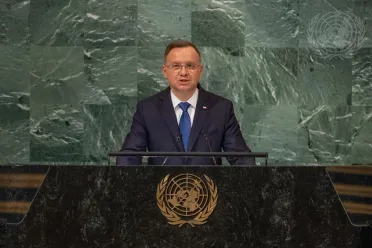Statement
Statement summary
ANDRZEJ DUDA, President of Poland, said the additional 3 million people in his country, which now has about 41 million people, are predominantly refugees from Ukraine. Some are permanent guests while others travel between Poland and Ukraine. The Russian Federation’s decision to wage this war was made by people prompted by imperial sentiment and colonial, nationalist hubris, exalting their own people and denying the right to self-determination to their sovereign neighbours. “This war is not a regional conflict. This war by the Russian Federation against Ukraine is a stoke of global fire. This war will bear on our countries and your countries. Unless it has already happened,” he said.
The food crisis, along with the spectre of famine, is one of the most dramatic effects of the Russian aggression, he said. Leaders around the world are worried about food security and further restrictions on the exports of grain and fertilizers from Ukraine and the Russia Federation, which has deliberately destroyed new crops and farming equipment. The invasion itself has drastically reduced Ukrainian harvests, with data indicating the Russian Federation has seized farmland making up 22 per cent of all agricultural land in Ukraine. Conservative estimates indicate that in 2022 alone, Ukraine’s harvest will be 35 per cent smaller. “It is an economic weapon, it is weaponization of food hitting the hardest Africa and the Middle East,” he said. The number of people suffering from chronic hunger since the war began will increase by about 47 million. The international community must ensure the compliance of parties to the 22 July agreements, signed in Istanbul, to allow the export of millions of tons of Ukrainian grain through the Black Sea.
Poland, along with its European Union partners, remains steadfastly committed to ensuring the exports of Ukrainian grain, including by land. A number of regulations exist in international law to protect food resources and the natural environment during conflicts. He cited the provisions of Article 11 of the International Covenant on Economic, Social and Cultural Rights, which recognizes the fundamental right of everyone to be free from hunger, and in which States pledged to distribute the world's food supplies equitably. In addition, Protocol I to the Geneva Conventions relating to the Protection of Victims of International Armed Conflicts (8 June 1977), in Article 54, prohibits, among other things, attacking, destroying, removing or rendering useless objects indispensable to the survival of the civilian population, such as foodstuffs and agricultural zones. He believed penalization mechanisms should be developed to bring to justice the perpetrators responsible for violating international law. “Those who knowingly destroy crops in the “breadbasket of the world” must know that they will be pursued to be prosecuted as long as they live,” he said.
While the response to the challenges on Ukraine are positive, complacency must not be avoided. “This is how I see the lesson learnt from this war: if the United Nations is truly to be united, every response to violations of international law should be identical, decisive and principled,” he said. The world is a system of communicating vessels. “Today the victim is Ukraine, but if Russian imperialism succeeds — then tomorrow it could be any country in the world,” he added.
Poland recognizes every State within its internationally recognized borders and demands respect for their inviolability. He said the Russian Federation owes Ukraine war reparations. It applies to any country plundering another country and to unsettled issues from the past. Poland shall not cease its efforts to hold the Russia Federation accountable for its violations of international law, both at the State-level as well as on the individual one. He commended the International Law Commission’s work to lead the drafting of the Convention on the prevention and punishment of crimes against humanity. “We will use all our powers and capabilities to ensure that the culprits are tried and punished. We are already cooperating with the International Criminal Court and the International Court of Justice to find the most effective ways to identify and prosecute the perpetrators,” he said.

